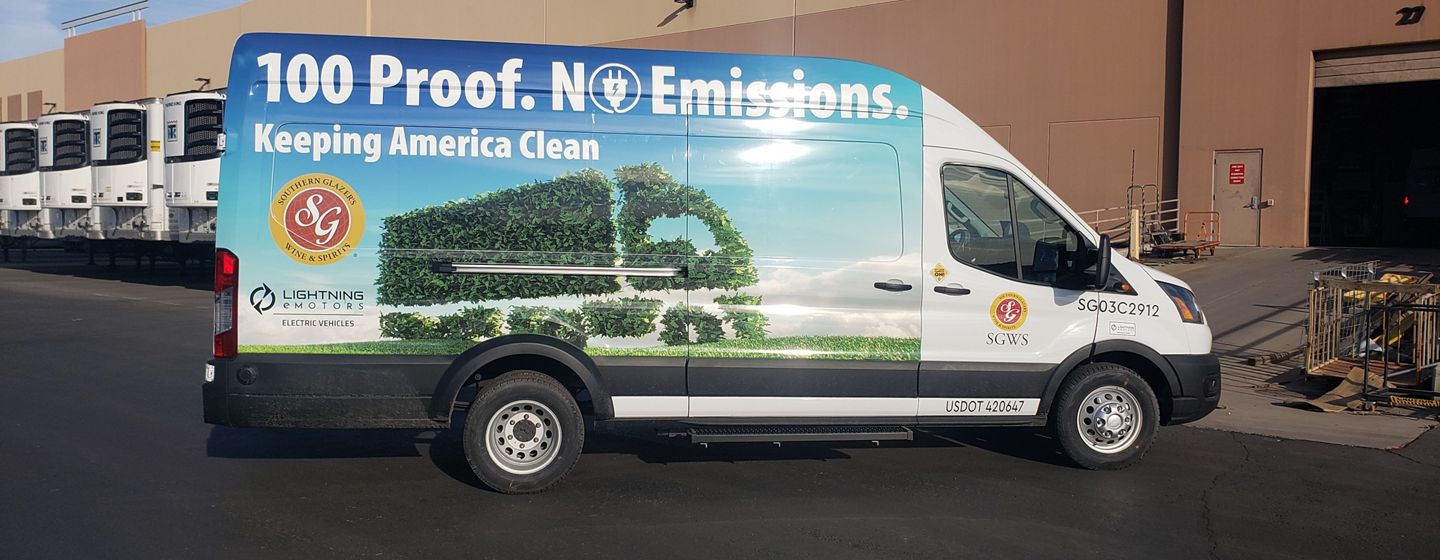Southern Glazer’s commitment to environmental sustainability continues to grow and evolve. Ensuring we are doing our part to reduce the Company’s carbon footprint and support the environmentally responsible values of our FAMILY, both current and prospective, is paramount. From our vehicles on the road to our warehouses, Southern Glazer’s Wine & Spirits is continuing to make thoughtful, environmentally-sound decisions. The Company is also engaging with suppliers and customers to identify
collaborative opportunities to advance our collective sustainability efforts.
Testing Electric Vehicles
Tapping into Alternative Fuel Electric vehicles can reportedly emit 64% less carbon emissions than petrol cars, giving them the capacity to significantly contribute to cleaner air around us and to our overall footprint. The 2021 Southern Glazer’s Wine & Spirits Exceptional Leaders Program (ELP) cohort worked with local operations leaders in Arizona to deploy pilot with vans leased from Ryder that were retrofitted using Lightning Motors electric engines. The pilot was conducted over a six-month period, from March through August 2021.
The results included a positive return on the environment, increased driver enthusiasm around sustainability, and the potential to realize 14% cost savings above the status quo. Following the completion of this program, Southern Glazer’s received a Clean Air Campaign Award from Valley Metro, the area’s public transportation agency, in the category of Sustainable Options/Corporate Sustainability.
The award, sponsored by the Arizona Department of Environmental Quality, Maricopa Association of Governments, Maricopa County Air Quality Department and Valley Metro, recognizes Valley commuters who are committed to promoting and using alternative modes of transportation. Southern Glazer’s Wine & Spirits also signed a purchase order with Xos, Inc. for 10 Xos Class 7 refrigerated beverage trucks. The 10, first-of-their-kind vehicles will be deployed from Southern Glazer’s Dallas/Ft. Worth distribution center and used as part of the Company’s delivery fleet supporting the North Texas market in the second half of 2022.
Plans to invest in electric vehicle charging stations at the facility are also underway. By implementing an electric vehicle fleet, the Company further aligns with trading partner initiatives, attracts professional driver talent, and increases driver retention. We look forward to continuing to explore alternative fuel vehicle solutions to conserve fuel and reduce our carbon footprint. In addition to this initiative, SGWS’ existing traditional vehicle fleet is SmartWay certified, entailing that we work closely with the Environmental Protection Agency (EPA) to measure, benchmark, and improve freight transportation efficiency. The SmartWay Program helps carriers demonstrate their efficiency achievements, show continuous improvement, and learn best practices to become even better. This program partnership is one of the several ways we ensure we are operating a sustainable fleet.
Managing Energy and Waste
Managing waste products in a responsible and efficient manner is critical at Southern Glazer’s Wine & Spirits. When product is expired or bottles are damaged, making sure the alcohol is properly disposed of is essential. Did you know that alcohol greater than 24% by volume, which is considered flammable/ hazardous, is distilled and biofuel is produced from it?
Fifteen years ago, Southern Glazer’s began its partnership with Parallel, the leader in renewable energy and biofuels production within the recycling community. Southern Glazer’s contributes approximately 5.6M gallons of fuel-grade ethanol to Parallel’s production annually, which reduces CO2 by more than 17,500 tons. Another successful SGWS initiative that is reducing waste is a recycling and composting program currently in place at Southern Glazer’s Wine & Spirits warehouse in Austin, TX.
In 2018, Southern Glazer’s Wine & Spirits Austin became part of the Universal Recycling Ordinance (URO) program, which supports the URO’s goal of reaching zero waste by 2024 in the city of Austin. Examples of items recycled at the facility include pallets, light bulbs, batteries, and shrink wrap. The Southern Glazer’s Wine & Spirits Austin facility uploads its recycling info into a comprehensive report that gets shared with the URO annually. What sets the Austin facility apart from other Southern Glazer’s Wine & Spirits warehouses is its composting program, which eliminates food waste in a sustainable way. Each week, 36-gallon carts are brought to the facility for food composting, equating to 0.25 cubic yards. According to information submitted to the city of Austin, 5,000 pounds of metal scrap and 696 individual pieces of wood or plastic were recycled in the city of Austin in 2020, along with 130 gallons of paper per month. Southern Glazer’s Wine & Spirits employees are trained annually on both the recycling and composting programs, in addition to the warehouse’s third-party vendor that routinely maintains the cleanliness of the facility.
Safely and sustainably disposing of our electronics is another key element of Southern Glazer’s environmental sustainability program. We partner with Procurri—an experienced IT asset disposition (ITAD) services provider, that keeps environmental, social and governance (ESG) standards as sustainable as possible by extending product life whenever possible to reduce society’s carbon and waste footprint—to collect IT equipment from more than 20 Southern Glazer’s Wine & Spirits locations nationwide. Since the inception of the program, 6,800kg of solid waste, 970,000 kWh of energy, and 169 kg of GHG emissions have been saved.
Pre-pandemic, about 50% of Southern Glazer’s suppliers used slip sheets to transport product. Now, 75% to 80% of supplier goods are being transported on slip sheets instead of wood pallets. A key driver around this change was the surging cost of lumber, which more than doubled during the pandemic. As a result of this shift, there are fewer loads and containers coming in, creating cost savings on both sides. Slip sheets, which are lightweight and reduce loading and unloading time, also create greater transportation efficiency, resulting in emissions savings. They are fully recyclable, limit deforestation, and prevent unnecessary waste from being deposited into landfills. Partnering with suppliers on this transition has been a success that is driving positive results across the board.


